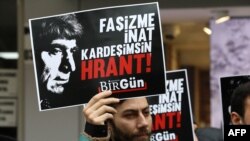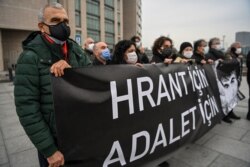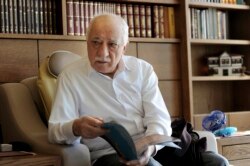A Turkish court sentenced two former police chiefs on Friday to life in prison for their role in the killing of prominent Turkish-Armenian journalist Hrant Dink more than 14 years ago, the Turkish state-owned Anadolu news agency said.
Editor of the bilingual Turkish-Armenian weekly Agos and a leading promoter of reconciliation between the Turkish and Armenian communities, Dink was shot twice in the head outside his office in central Istanbul.
After the slaying, tens of thousands of people gathered in central Istanbul to mourn. His death plunged Turkey's Armenian community into mourning and sparked a sprawling trial that lasted more than a decade and involved senior security officers who were accused of being aware of the plot to kill Dink but failing to act.
Istanbul's main court sentenced the city's former police intelligence chief Ramazan Akyurek and his former deputy Ali Fuat Yilmazer to life in prison for "premeditated murder," according to Agos.
Former top Istanbul interior ministry officers Yavuz Karakaya and Muharrem Demirkale were also jailed for life, while charges against another top city police chief were dropped because of the statute of limitation.
In 2011, Dink's assassin, Ogun Samast, was sentenced to nearly 23 years in prison by a juvenile court. He was 17 when the killing took place. The following January, a man named Yasin Hayal was sentenced to life in jail for instigating the killing.
Ali Oz, a former interior ministry commander of the Black Sea region of Trabzon where the gunman came from, was sentenced Friday to 28 years in jail.
Dink's supporters and rights activists still maintain that the most senior police officials have gone unpunished and want the investigation and trials to run on.
"Some of those responsible for this assassination, including the sponsors, have still not been prosecuted," said Erol Onderoglu, Turkey representative for Reporters Without Borders (RSF), who has closely followed the trial.
"This partial justice rendered after 14 years leaves a bitter taste and should not mark the end of the search for the truth."
State media said the court ruled that the murder was carried out in line with the goals of a clandestine network linked to U.S.-based Fethullah Gulen, a Muslim preacher whom Ankara accuses of orchestrating an attempted coup in July 2016.
Gulen, who has lived in the United States since 1999 and denies any involvement in the failed putsch, was one of 13 fugitives from justice among 76 defendants on trial in the Dink case. The court did not rule on the case of Gulen and the other 12 fugitives and instead separated their cases.
Various other defendants in the Dink case were given jail sentences on charges including accessory to murder and membership of a terrorist group — because of links to Gulen's network — as well as faking and destroying documents, state media said.
The Istanbul court ruled Friday that Dink's murder was committed "in line with the objectives of Feto," an acronym Ankara uses for Gulen's banned movement, NTV reported.
Dink's wife, Rakel, had said in January that blaming Gulen's movement for her husband's death nearly a decade before the failed coup was like, "I didn't kill him, but my hand did."







